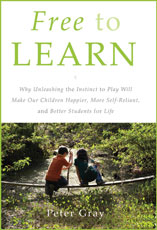"If we had the will, we could free children from coercive schooling and provide learning centers that would maximize their ability to educate themselves without depriving them of the rightful joys of childhood," writes Peter Gray, research professor in the Department of Psychology at Boston College and author of the popular blog "Freedom to Learn" for Psychology Today. He begins his cogent advocacy for the central role of play in children's emotional, social, and intellectual development with a scorching attack on our compulsory education system with its rigid lessons, standardized tests, and an emphasis on performance. This system goes against kids' natural curiosity and creativity and puts more pressure on them. Later, Gray lays out "The Seven Sins of Our Forced System of Education," including undermining the intrinsic motivation to learn; judging students in ways that foster shame, hubris, cynicism, and cheating; and a reduction of skills and knowledge.
Gray contrasts this terrible educational model with "the play-filled lives of hunter-gatherers" where the core values are autonomy, sharing, and equality. He also gives high marks to Sudbury Valley School in Framingham, Massachusetts, which has been around for four decades as a democratic community where each student is responsible for his or her own education. There are no curriculum, tests, or ranking of students. Gray salutes the time and space given to play and exploration, the age-mixed interaction of older kids who teach the younger ones skills they need as well as ways of thinking, the free exchange of ideas, and access to caring adults who trust children and their ability to make the most of freedom.
Play, he argues, has educative power. It enables students to exercise their imagination, to deal with problem solving, and to work together with others as collaborators and co-creators. In his final overview of play, Gray claims it is self-chosen and self-directed; it is motivated by means more than ends; it is guided by mental rules; and it is conducted in an alert, active but non-stressed frame of mind. Free to Learn makes a good case for the importance of play as a renewable resource for school reform and transformation.
